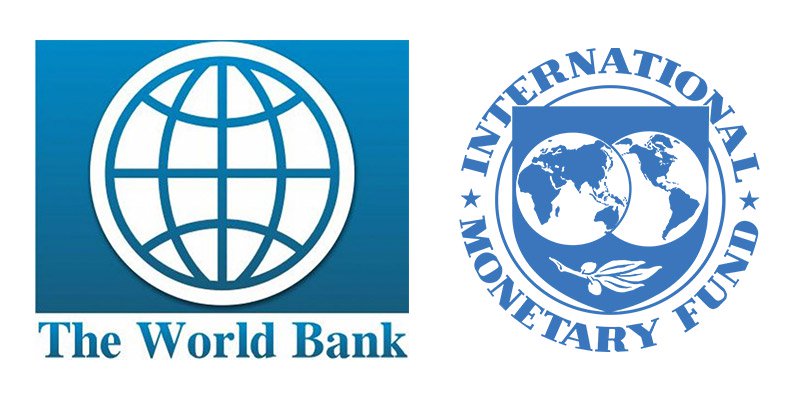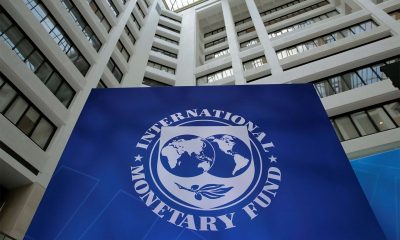Economy
Nigeria Urgently Needs Stronger Policies to Revamp Economy—IMF
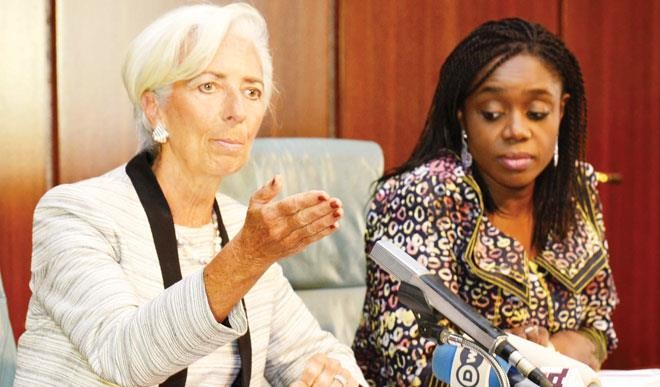
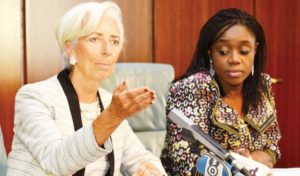
By Modupe Gbadeyanka
The International Monetary Fund (IMF) has advised the Nigerian government to quickly come up with stronger macroeconomic policy to revamp the economy and restore confidence of investors in the country.
This suggested was made by the IMF Executive Board, which concluded the Article IV consultation with Nigeria on Wednesday, March 29, 2017.
The board recognized that the Nigerian economy had been negatively impacted by low oil prices and production, which forced it into a recession in 2016, with growth contracting by 1.5 percent.
It commended the efforts already made by the authorities to reduce vulnerabilities and enhance resilience, including by increasing fuel prices, raising the monetary policy rate, and allowing the exchange rate to depreciate.
However, in light of the persisting internal and external challenges, the IMF emphasized that stronger macroeconomic policies were urgently needed to rebuild confidence and foster an economic recovery.
The IMF further said under unchanged policies, the outlook remains challenging. Growth would pick up only slightly to 0.8 percent in 2017, mostly reflecting some recovery in oil production and a continuing strong performance in agriculture.
Policy uncertainty, crowding out, and FX market distortions would be expected to drag activity. Accommodative monetary policy would keep inflation in double digits. Financing constraints and banks’ risk aversion would crowd out private sector credit and increase the Federal Government’s already high debt service burden, it warned.
It said a continued policy of prioritizing exchange rate stability would lead to an increasingly overvalued exchange rate, leading to a deterioration in the non-oil trade balance and gross reserves below adequate levels.
Economy
NCDMB Issues NCEC Guidance Notes to Ease Oil Contracts, Cut Production Costs

By Adedapo Adesanya
The Nigerian Content Development and Monitoring Board (NCDMB) says it has issued the Nigerian Content Equipment Certificate (NCEC) guidance notes to speed up oil and gas industry contracting processes, weed out firms lacking technical capacity to perform, and to reduce Nigeria’s cost of oil production.
The document forms part of concerted efforts to operationalize the Presidential Directives (PDs) on Local Content Requirements, which mandates NCDMB to take further steps to eliminate intermediaries in the contracting process, lacking demonstrable capacity.
Emphasising that one of the key requirements for participating in the Nigerian oil and gas industry contracting process is the possession of NCECs issued by the NCDMB, the document states that “Unmerited possession and/or misapplication of the NCECs during tendering/bid evaluations contribute to contracting delays and admittance of unqualified intermediaries into the contracting process”.
According to NCDMB, the goal of the new document is to “tackle cases of single and multiple NCEC applications not matched to capacities on ground, submission of fake/forged documents, under declaration of personnel, non-existent offices/equipment, and many other dubious applications.”
It will also enhance timely review and approval of applications from genuine service companies as the document provides all the requirements needed to complete credible application at first attempt.
The eight NCEC categories cover Manufacturing & Related Services (MS); Fabrication & Construction (FC); Construction & Moveable Equipment (EC); Services & Support (SS); Quality Control Inspection and Testing (QS); Non-Moveable Assets (DA); Procurement & Supplies (PS); and Consultancy Services (CS).
The document advised service companies to provide details of their specific service offering with sufficient supporting evidence while applying for any of the NCEC categories via the application portal. Providing further explanation, NCDMB stressed that it does not solicit or require any payment for the application, processing, or approval of NCEC or any of its certifications.
It added that “in line with the Presidential directive on Local Content compliance, NCDMB prohibits the use of agents/middlemen/third parties in raising/submission of NCEC application on behalf of service companies. Service Companies registered on the NOGIC-JQS are liable for any claims/documentations submitted in support of application for NCEC or any other NCDMB certifications using their assigned login in details.”
The document also indicated that companies and their subsidiaries or local partners cannot apply for or obtain NCEC as separate companies using the same facilities, equipment, assets, or documentation and NCEC is not transferable for use by another company.”
Continuing, the guidance notes enjoined service companies to only apply for NCECs based on their core service area, noting that spurious applications contribute to delays in the processing of genuine applications, warning that cases determined to constitute abuse of NCEC applications shall attract applicable sanctions.
The NCEC notes also indicated that companies applying for multiple NCECs must have the capacities in terms of assets, facilities, equipment and personnel to execute the scope of activities under the target NCEC categories, adding that NCDMB will carry out facility visits to ascertain the capacities and capabilities claimed by the company in all the multiple NCEC applications.
It stated further that NCECs are not granted in anticipation of establishment of local capacities but are approved based on functional equipment/assets with dedicated resources/utilities in place to operate or perform the services, hence applicants must be ready to demonstrate operability and availability of owned assets/equipment as may be required during facility visit by NCDMB team.
The document also listed services which do not require NCECs. They include GSM service providers, commercial airlines, educational institutes, legal advisory services, public relations and events management, government agencies, and CSR projects with community vendors.
Speaking on the guidance notes, the Executive Secretary of NCDMB, Mr Felix Ogbe enjoined oil and gas stakeholders to study the guidance notes while applying for NCECs, warning that submission of forged, altered, or falsified documents constitutes a criminal offence and will attract legal consequences as well as board’s administrative punishments.
He noted that NCDMB had set target timelines for the review and processing of NCEC applications, with the portal providing timestamp of all activities/interactions undertaken from the point of submission of application and all reviews by the board.
Economy
Nigeria’s Forex Reserves Now $49bn on Reforms—Cardoso
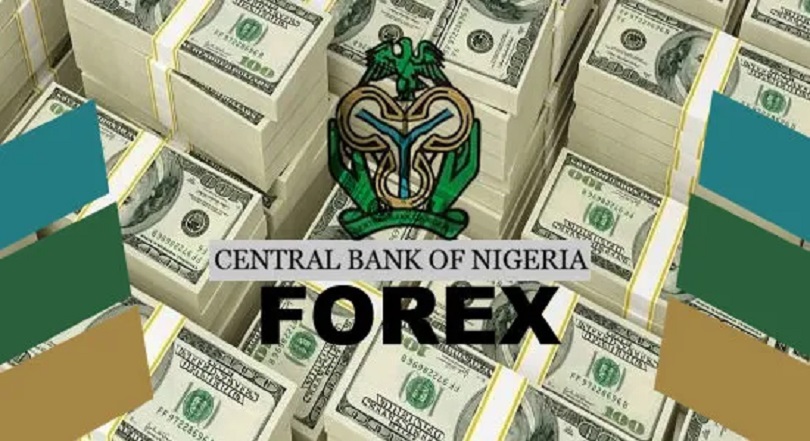
By Adedapo Adesanya
The Governor of the Central Bank of Nigeria (CBN), Mr Yemi Cardoso, has disclosed that Nigeria’s external reserves have risen to about $49 billion as of February 5, 2026, describing the development as a clear sign of improving confidence in the country’s economy.
Mr Cardoso spoke on Monday in Abuja at the second edition of the National Economic Council (NEC) conference, where he explained that the growth in reserves represents a 4.93 per cent increase from the last figure of $46.7 billion which marks a major turnaround from what the country faced when the current leadership took over the apex bank.
“This is obviously a very important statistic,” Mr Cardoso said. “When we took over, the net reserve figure was about $3 billion. As at the end of last year, the net reserve figure had gone up strongly into the 30s. And as I said, as of February 5, 2026, it is $49 billion. We are now net buyers.”
He explained that the central bank now allows the foreign exchange market to largely determine prices, while the bank steps in to buy foreign exchange when necessary. According to him, this approach has helped to close the gap between the official and parallel market exchange rates. “The premium between the official and parallel market rates has collapsed to under two per cent,” he said.
Mr Cardoso said remittances from Nigerians living abroad have played a major role in boosting the country’s foreign reserves. He noted that Nigerians in the diaspora come from all parts of the country and are keen to support the economy by sending money home.
“Remittances have made a big difference to how we have grown our reserves,” he said. “The diaspora come from every single state represented here. We have engaged with them and made it easier for them to remit money back to Nigeria.”
He added that the cooperation of state governors and other leaders would be crucial in sustaining this progress in the coming years.
The CBN helmsman said recent reforms have also made foreign exchange more accessible to ordinary Nigerians, especially those travelling abroad.
“When people travel now, you don’t have to look for foreign exchange to travel,” he said. “You use your Naira card and pay for whatever you want. Now the Naira is more competitive and people are not afraid to hold Naira.”
He warned Nigerians who are holding foreign currency without real need that such actions could lead to losses.
“Those holding unnecessary foreign exchange reserves are losing money every day,” he said.
Economy
Six Price Gainers Rally OTC Securities Exchange by 2.09%

By Adedapo Adesanya
Six price gainers lifted the NASD Over-the-Counter (OTC) Securities Exchange by 2.09 per cent on Monday, February 9, amid a surge in activity level.
According to data, the volume of securities significantly increased by 3,499.1 per cent to 13.3 million units from the 384,784 units recorded in the preceding trading session, as the value of securities soared by 518.0 per cent to N99.3 million from N16.1 million, and the number of deals moved up by 95.8 per cent to 47 deals from the preceding session’s 24 deals.
Central Securities Clearing System (CSCS) Plc ended the day as the most active stock by value on a year-to-date basis with 16.9 million units exchanged for N699.9 million, followed by Geo-Fluids Plc with 23.2 million units valued at N123.6 million, and FrieslandCampina Wamco Nigeria Plc with 1.8 million units traded for N118.5 million.
However, Geo-Fluids Plc became the most traded stock by volume on a year-to-date basis, with 23.2 million units worth N123.6 million, as CSCS Plc was pushed down the pecking order as second with 16.9 million units transacted for N699.9 million, while Mass Telecom Innovation Plc sold 15.1 million units for N6.1 million.
The price gainers were led yesterday by Okitipupa Plc after it gained N17.00 to trade at N237.00 per share versus the previous price of N220.00 per share, FrieslandCampina Wamco Nigeria Plc added N6.00 to sell at N66.00 per unit versus N60.00 per unit, and CSCS Plc grew by N5.35 to N58.85 per share from N53.50 per share.
Further, IPWA Plc appreciated by 23 Kobo to N2.59 per unit from N2.36 per unit, UBN Property Plc increased its value by 19 Kobo to N2.19 per share from N2.00 per share, and Industrial and General Insurance (IGI) Plc advanced by 5 Kobo to 59 Kobo per unit from 54 Kobo per unit.
However, Nipco Plc lost N9.00 on Monday to close at N250.00 per share versus last Friday’s price of N259.00 per share, and Geo-Fluids Plc dipped by 22 Kobo to N4.08 per unit from N4.30 per unit.
At the close of business, the market capitalisation of the bourse was up by N46.2 billion to N2.253 trillion from N2.207 trillion, and the NASD Unlisted Security Index (NSI) jumped 77.22 points to 3,766.94 points from 3,689.72 points.
-

 Feature/OPED6 years ago
Feature/OPED6 years agoDavos was Different this year
-
Travel/Tourism9 years ago
Lagos Seals Western Lodge Hotel In Ikorodu
-

 Showbiz3 years ago
Showbiz3 years agoEstranged Lover Releases Videos of Empress Njamah Bathing
-

 Banking8 years ago
Banking8 years agoSort Codes of GTBank Branches in Nigeria
-

 Economy3 years ago
Economy3 years agoSubsidy Removal: CNG at N130 Per Litre Cheaper Than Petrol—IPMAN
-

 Banking3 years ago
Banking3 years agoSort Codes of UBA Branches in Nigeria
-

 Banking3 years ago
Banking3 years agoFirst Bank Announces Planned Downtime
-

 Sports3 years ago
Sports3 years agoHighest Paid Nigerian Footballer – How Much Do Nigerian Footballers Earn



